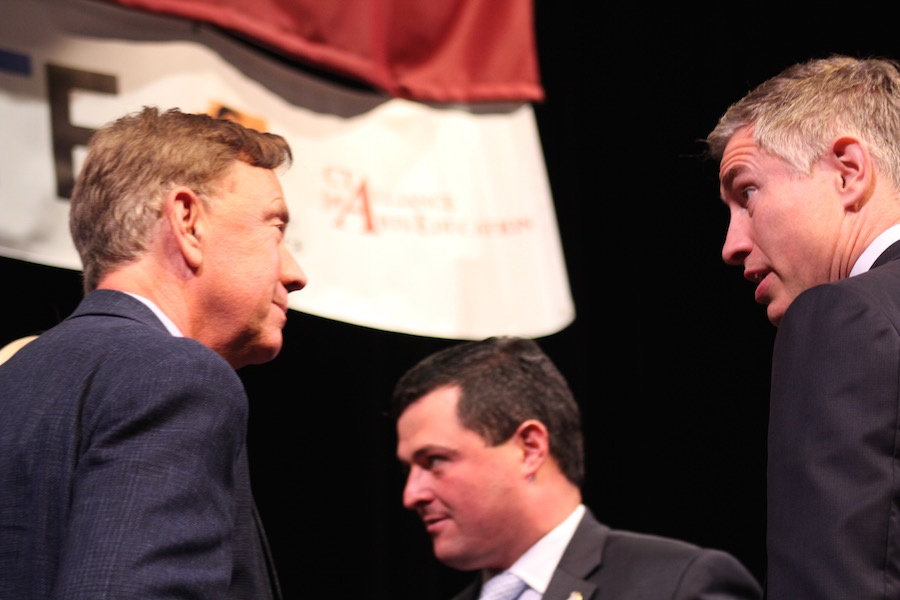
Co-Op | Elections | Greater New Haven | Politics | Arts & Culture | Campaign 2018
.jpg) Lucy Gellman Photos.
Lucy Gellman Photos. More state funding to their nonprofit organizations. Assurances that creative school programs won’t be cut. Better partnerships between organizations who do community-oriented work. A commitment to changing the line item funding formula so money gets spread a little more evenly.
With one week to go until the Aug. 14 gubernatorial primary, these were the responses of a few voters—and one soon-to-be-voter—who said that they'll be thinking about the arts as they hit the polls and cast their votes on one Tuesday in August, and a crisper one later this November. In the latest from our vox populi series, collected at a candidate forum on arts, culture and the future of Connecticut's economy, hear what they had to say.
Maegan Fuller, Circus Teacher at ARTFARM and Oddfellows Playhouse in Middletown and in the Hartford Public Schools
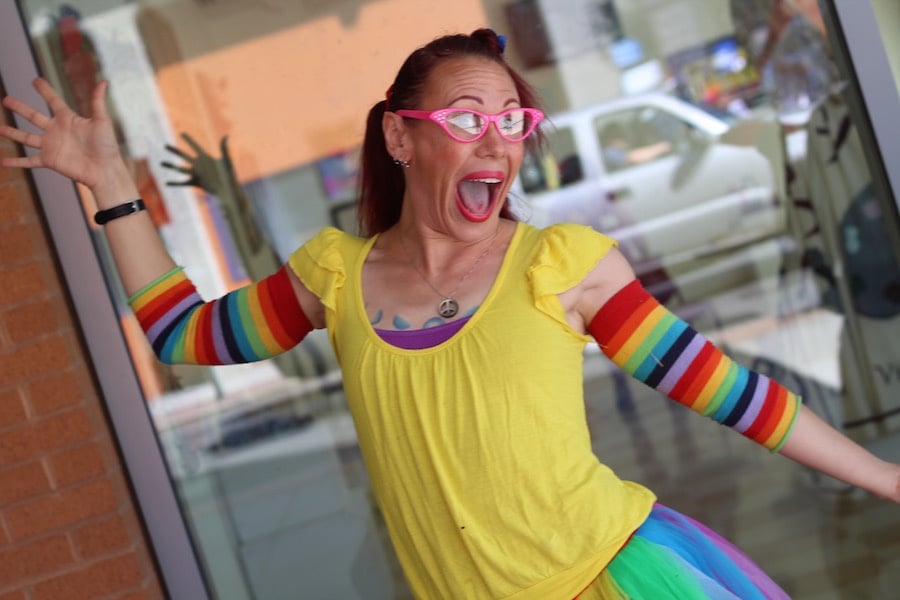
I’d just like to see a little bit more emphasis focused on the arts. They’re so important to children’s learning—just different aspects of learning.
Do you mean funding from the state?
Oh, absolutely! They [the powers that be at the state] continue to pull from the different arts, and they need to put in more. A lot of the underfunding stands out to me—the desire to cut back, like it’s not important. I teach arts—I’m a circus teacher at one of the schools in Hartford, and I worry every day that they’re going to cut to the point that I’m not going to have a job anymore. They’ve cut back hours and classes every year.
If someone were to ask you, pointedly, what your students stand to lose if that curriculum were cut—what's the answer?
Oh, a creative outlet! Just being able to express themselves on their level, rather than having to sit and just do the academics. It’s physical, it’s fun, it’s silly—at least in my aspect, because of the circus. It’s just very important to development.
One of the best things that I saw—it was a Facebook meme, but still—it said: “have somebody who says that the arts aren’t important, have them go through their life for one day without any arts.” No music, no art, no anything. And then try and say that it’s not important.
Walter Morton, Member of Hamden's Board of Education and Organizer with the Ned Lamont Campaign
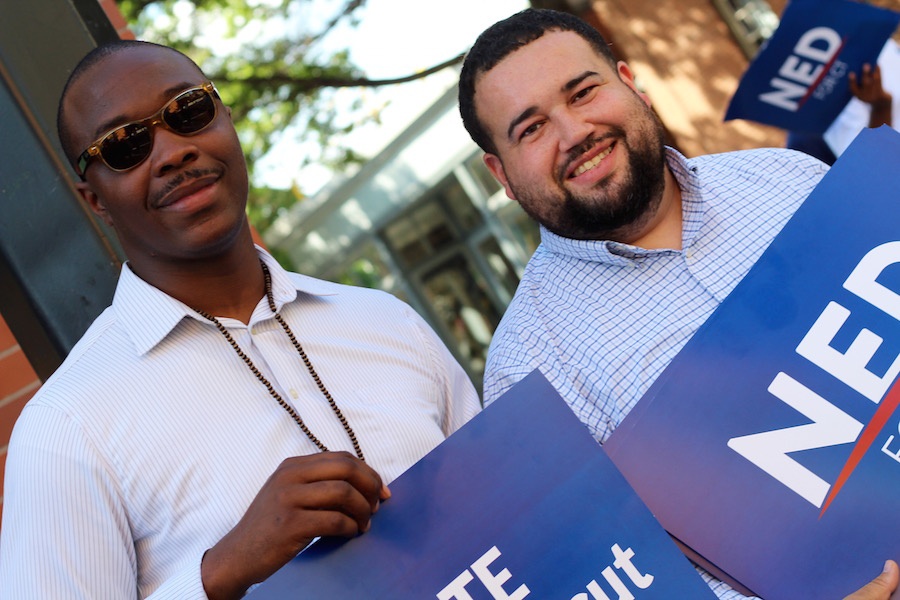 Morton pictured with New Haven Alder David Reyes.
Morton pictured with New Haven Alder David Reyes.
I think arts is an important part of education. I’m on the Board of Education in Hamden, actually, and that’s a very important part of the curriculum. I mean, not everyone’s strength is necessarily math or reading and writing, and I don’t think education’s about just those subjects. But it’s just—giving students a chance to be well-rounded and explore their interests. There are some students who are very artistic. I’m not one of them, but I think it’s important. I enjoy different forms of art, whether it’s music or movies or plays. So I think it’s important that we have that well-rounded type of curriculum for our students.
Also, what it does for the economy as well. That’s something that should be considered as well. So I think that’s important, and I think it’s important that candidates care about arts as well. It’s expression.
What about cuts to the arts on the state level?
Being on the Hamden Board of Ed, I know that when it comes time to cut the budget, they look at things that they consider extracurricular in nature. The three Rs—reading, writing, arithmetic—are considered the bedrock of education. But honestly, I think that arts, athletics play a very important role and we should fight for it. If it comes to budget cuts and making tough decisions and municipalities getting less funding, like my town in Hamden, unfortunately cutting those programs may have to be part of the discussion. They may become a reality.
Chloé Lomax-Blackwell, Actor and Co-Op High School Student. Lomax-Blackwell said she can’t yet vote, but thinks and talks about politics with her colleagues and family.
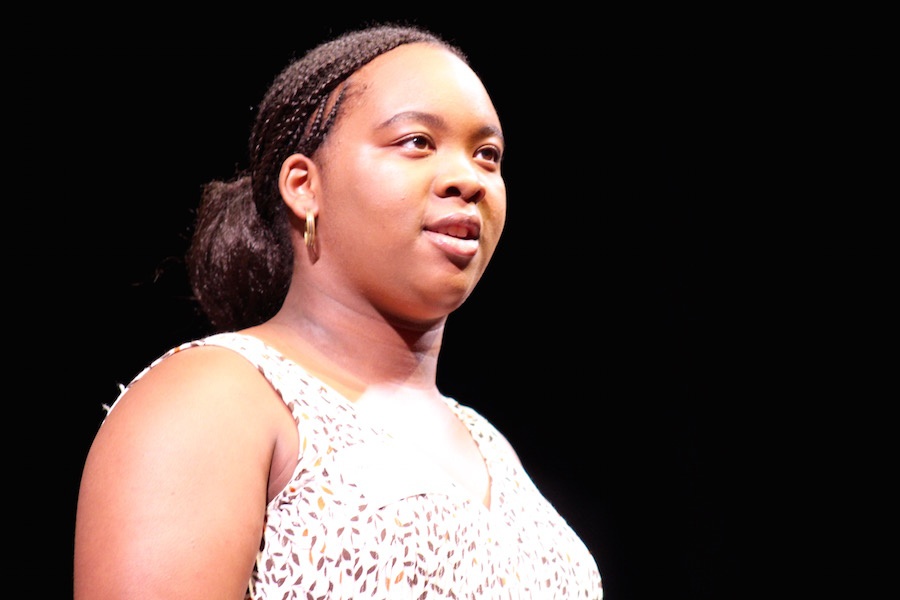 Chloé Lomax-Blackwel, who performed as Tonya from August Wilson's King Hedley II.
Chloé Lomax-Blackwel, who performed as Tonya from August Wilson's King Hedley II.
Once I heard about the budgeting problem [she'd mentioned how kids in wealthier towns often have access to more robust arts programs], I was like “this doesn’t make sense to me at all.” For me, education is at the top of the list. I feel like arts actually helps you with education. It’s helped me.
When I was younger, I was terrible at math. My dad’s a musician. Once I started playing panio, guitar, learning the notes, it disciplined me and helped me to focus. Doing theater, memorizing your script helped me memorize those math problems. Equations. Got me better. I feel like it’s just like that with everybody in the arts. It just helps you become disciplined and grounded in your education.
If I could talk to the candidates—I’d just ask them to reflect on what you’re doing. Think back to what made you want to start this in the first place. I feel like over time, my art will start to lost its value. Or the importance of why I’m doing it.
One of the things candidates talk about is retaining talent—how to keep artists in Connecticut. Is that something you think about?
Actually, yes. When I graduate, I want to go to New York. I kind of want to escape Connecticut. I would come back, but my mindset hasn’t really been in Connecticut. I want to go farther. I’m just tired of where I am right now. I want to discover my options.
Bitsie Clark, Former Executive Director of the Arts Council of Greater New Haven and one of the Architects of the Audubon Arts District
.jpg)
Well, first of all, the arts are always facing money issues. Always. And in my experience in 20 years at the Arts Council, and looking back on it, to my amazement, I discovered that when we really made progress was when times were bad—because you had to work together and you had to find ways to cooperate with each other.
In the early 90s, things were so bad that I laid off everybody in my office for a month, and then I laid ‘em off again for two weeks at Christmas. We all went on unemployment. It was very serious. But I realized that just five years before, we had been getting something like $4,000 from AT&T to put on a cocktail party! But you didn’t think about it at that.
So I don’t particularly like the whole concept of sitting around and feeling sorry for yourself. I think it’s important to say “yes, things are bad, things are hard.” But that’s all a reason why we’ve gotta work harder, find out what the guy next door is doing, work with him. When I first came here, none of the arts institutions knew each other at all … they didn’t help each other. The thing that actually made them come together was the AIDS epidemic. We put on an event called “Hearts for AIDS,” and that was the first time that everybody came together, because they’d all lost somebody.
The whole sort of defeatist attitude is not helpful. And it’s not helpful in this sort of political campaign either. The most important thing is that we get people to vote. Because if you start pissing and moaning about everything, you get nowhere.
Al Heartley, Director of Development at Eugene O'Neill Theater Center
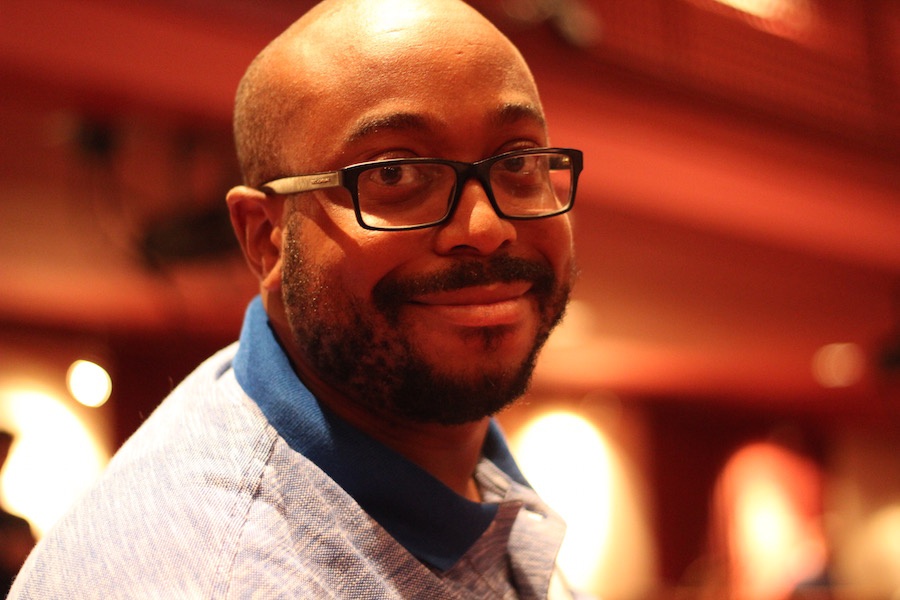
I think that especially in Connecticut, continuing to think about state funding and state support is really key—and also figuring out the economic argument around the arts and economic development opportunities. I think it’s the same, especially in our theater field, about working with partnerships and working with other organizations about how we can partner together to expand the impact of the arts.
So right now, with state line item funding, there’s a lot of money that goes to a few organizations. So what would you like to see (if anything) that’s different?
I mean, always I think there’s room for more with Connecticut’s … I think there are a lot of cultural organizations, big and small. I think it’s about—how do you create more funding opportunities? Whether it’s through a foundation, whether it’s through more government giving, and figuring out how to let in some of those folks and some of those organizations that are so vital to Connecticut.
So you have candidates like Tim Herbst that have said they would pull all state funding from sanctuary cities. Everything. Including funding that also goes to the arts in those cities. When you think about something like that, what do the arts have to lose [if a city loses its funding]?
I mean, everything! The way that we get support not only from state but from city and municipal money, it would be devastating potentially, if that was pulled. And I think, in many ways, unfair.

